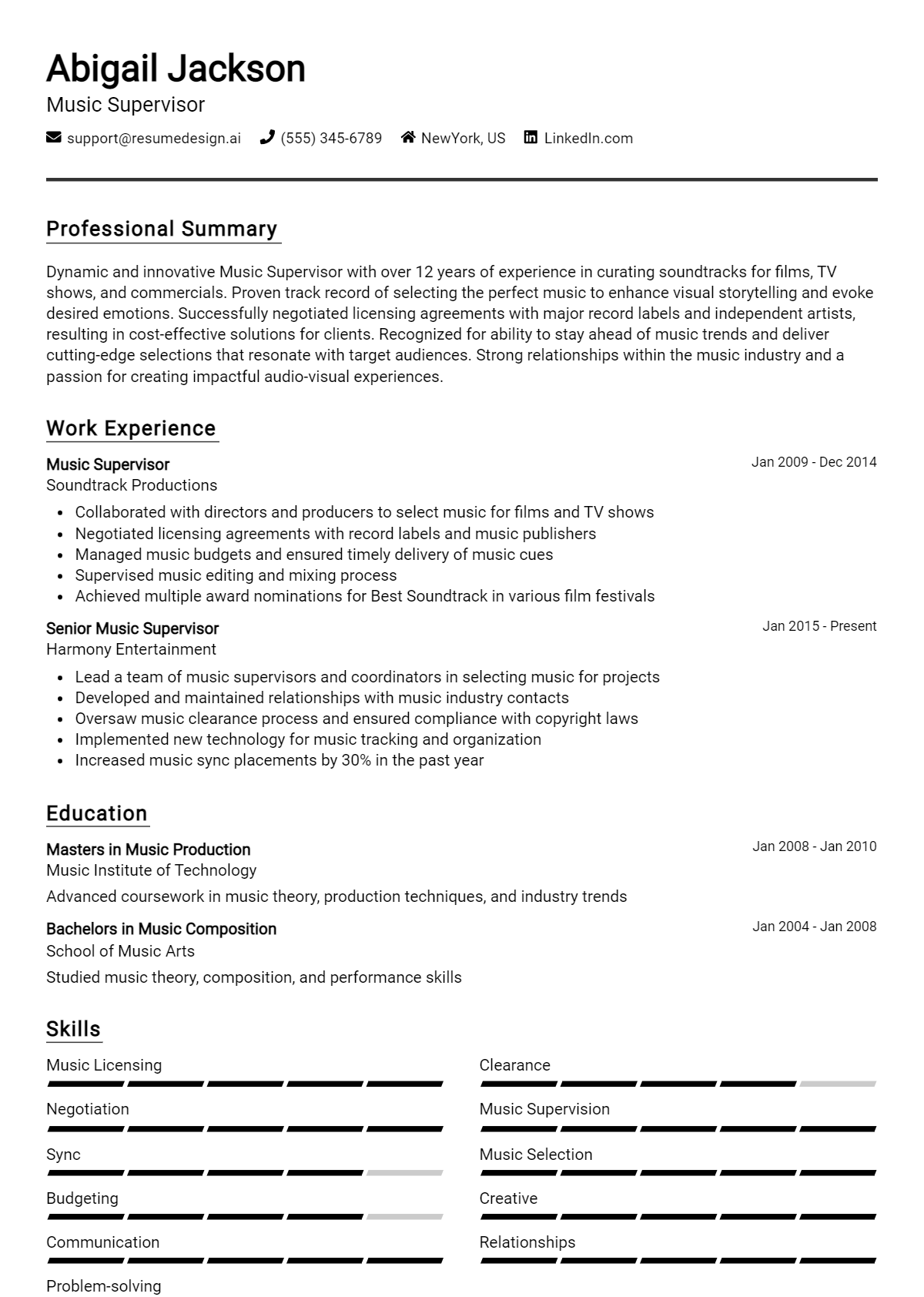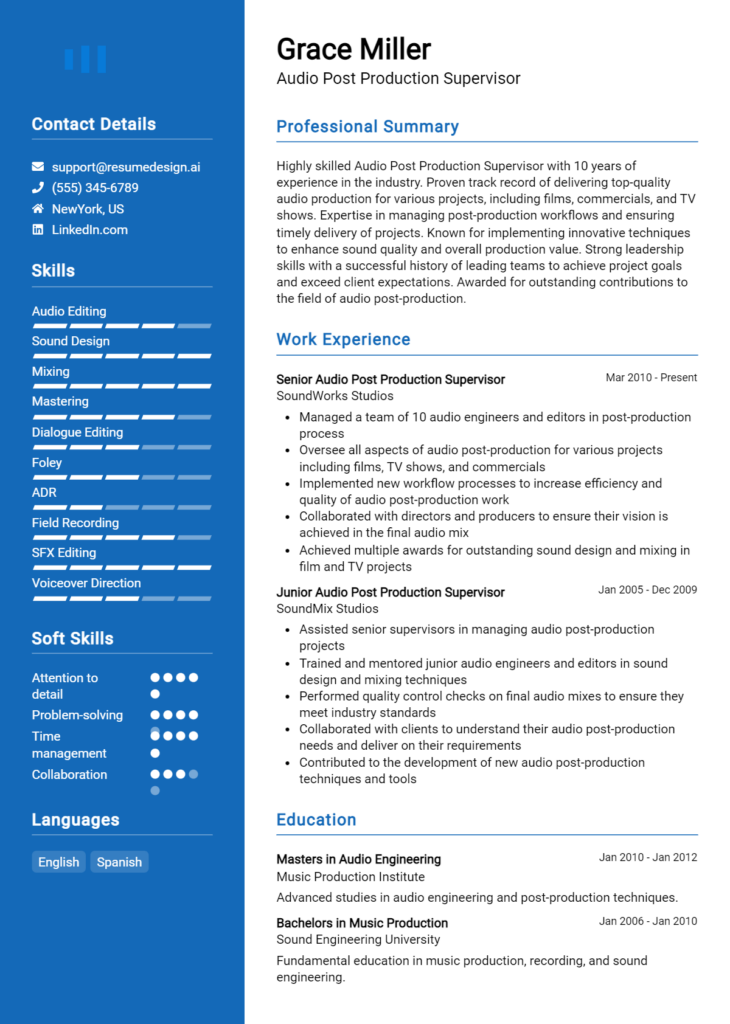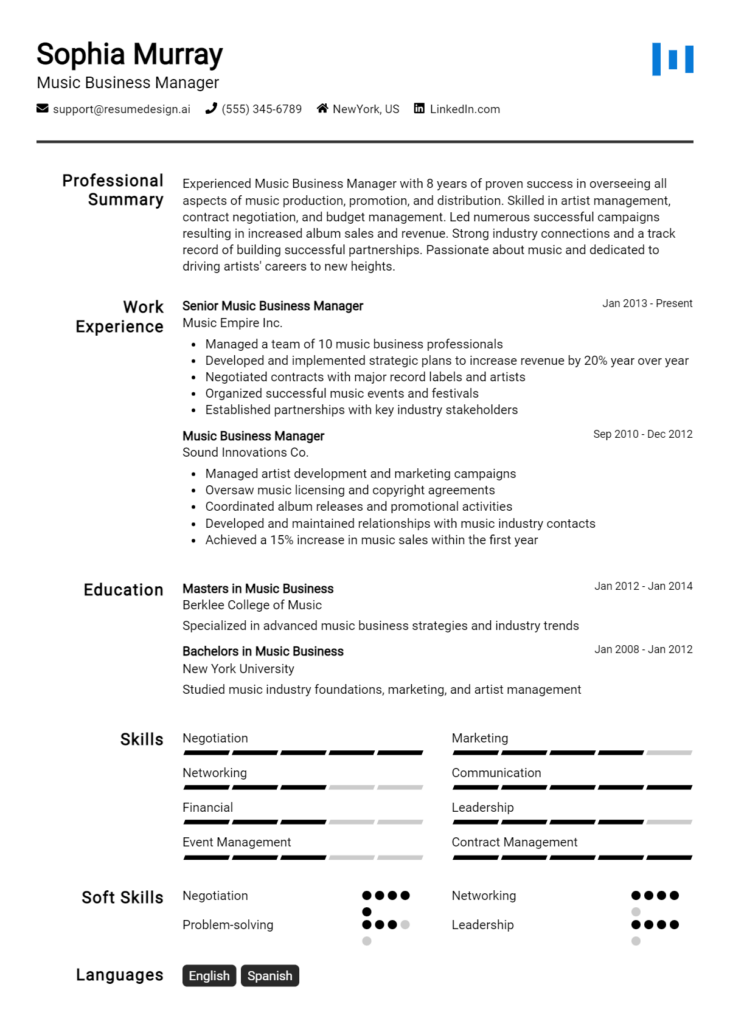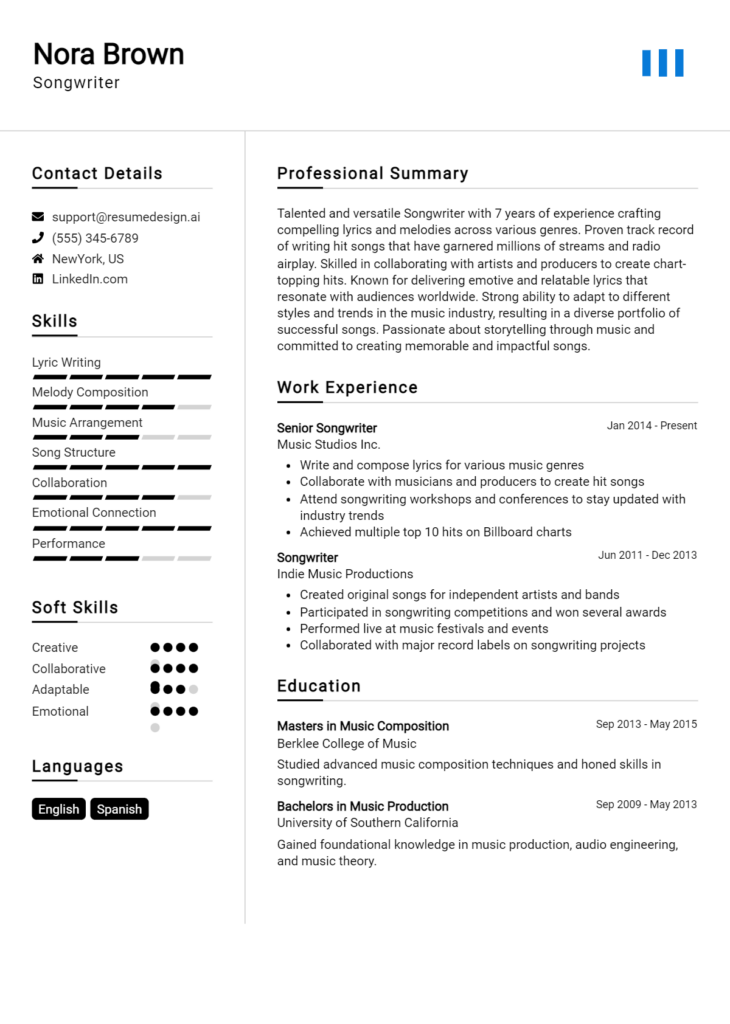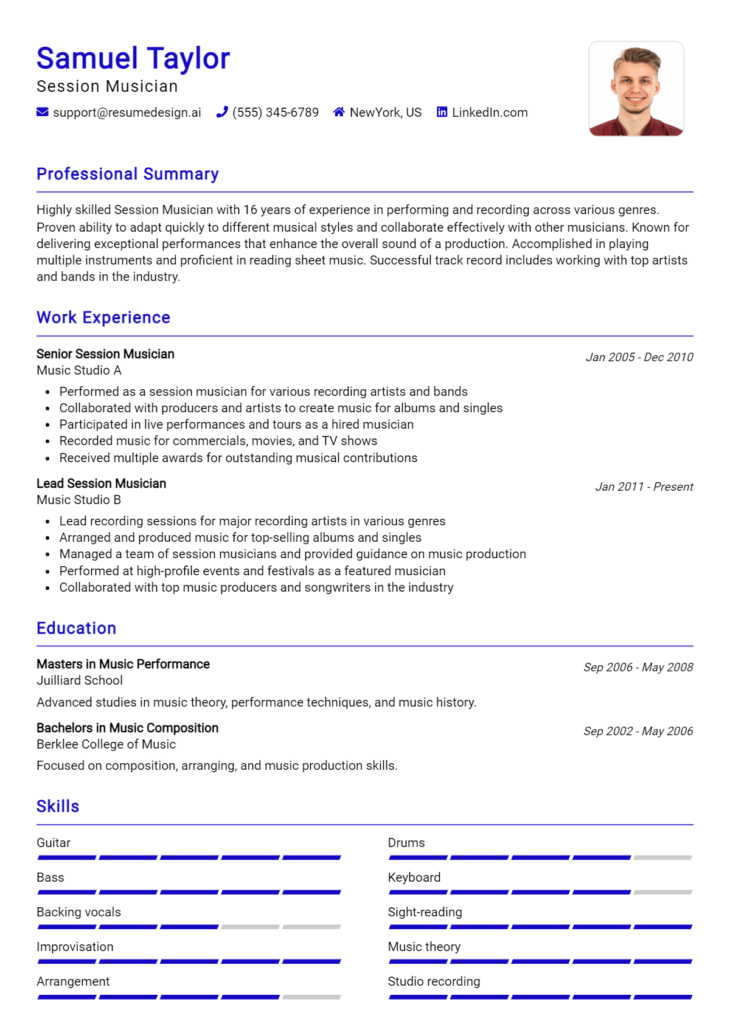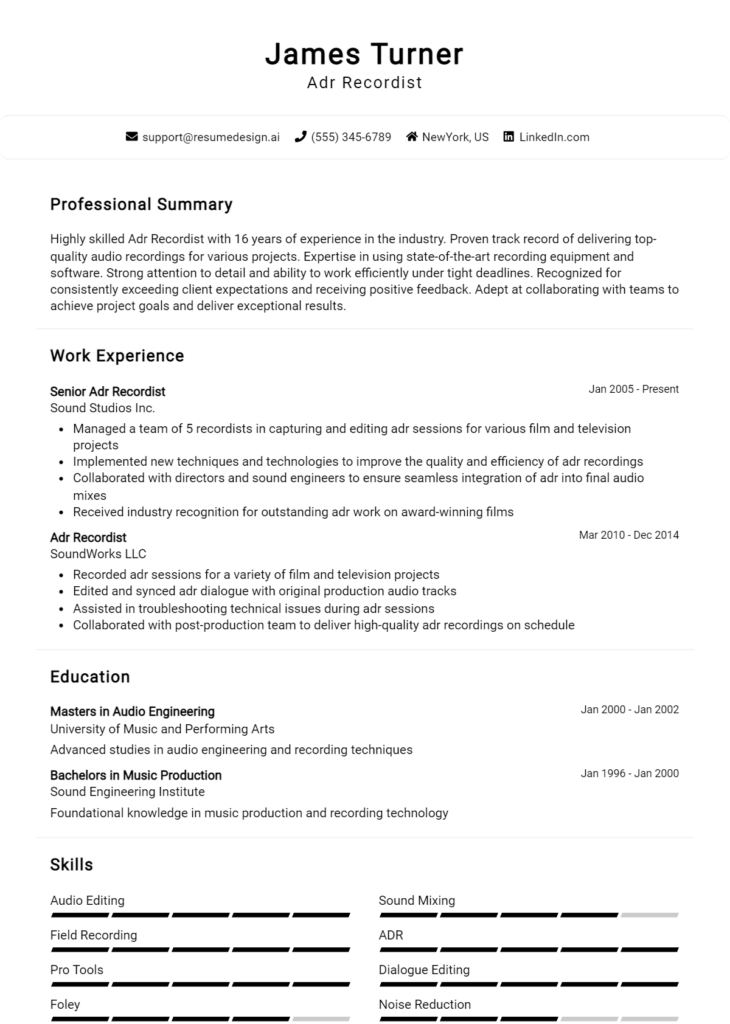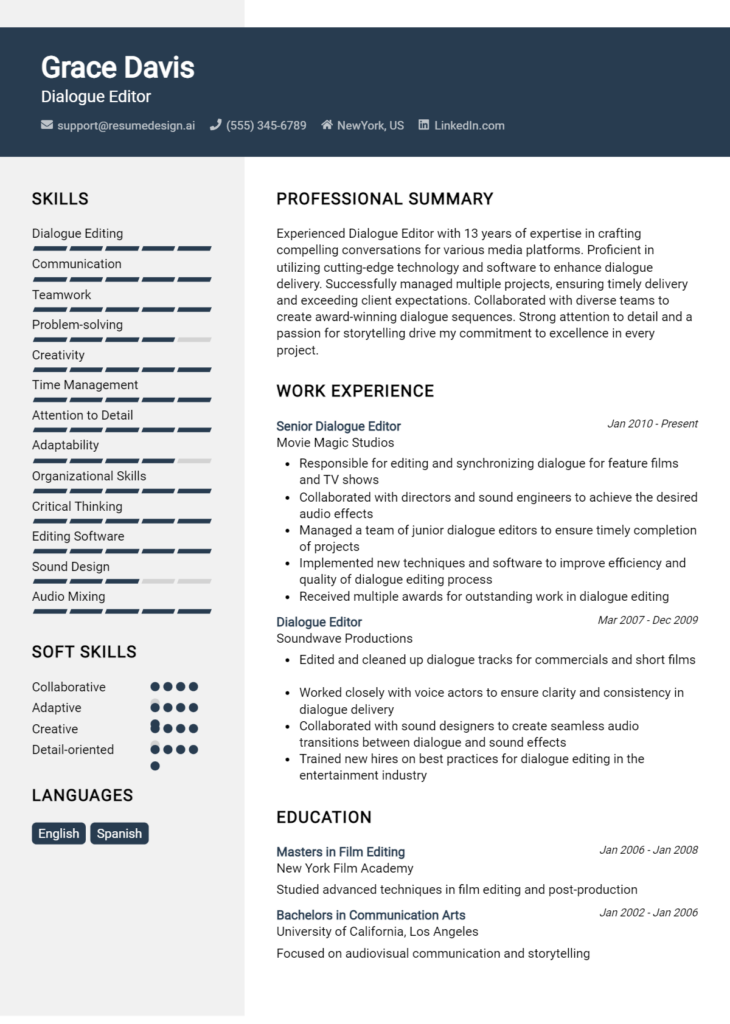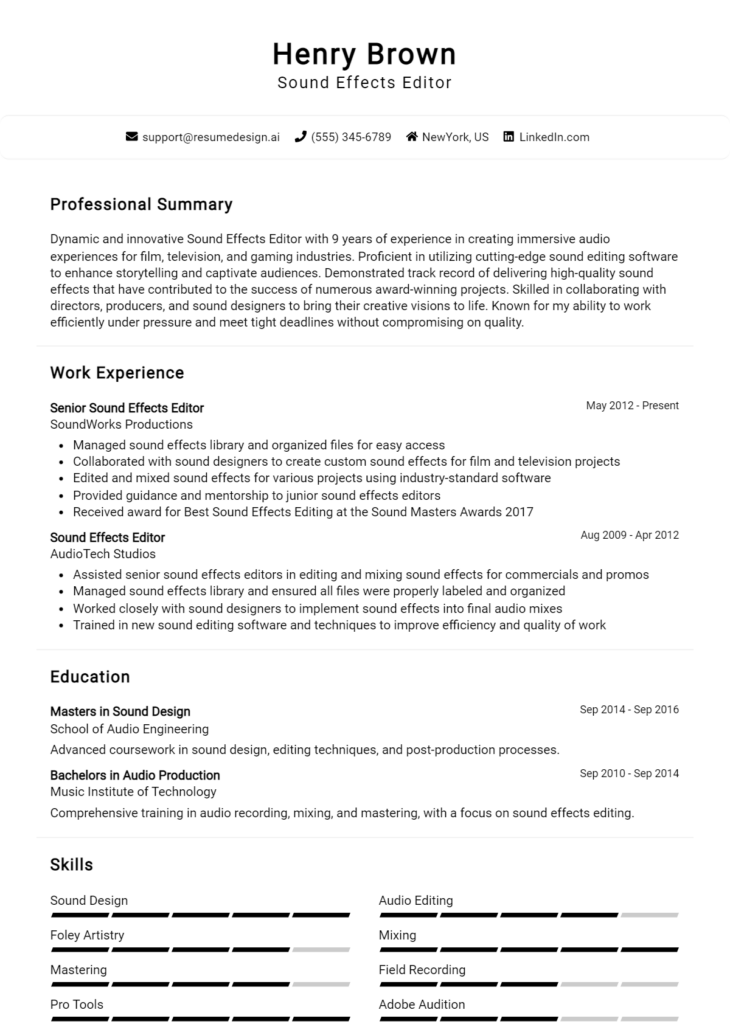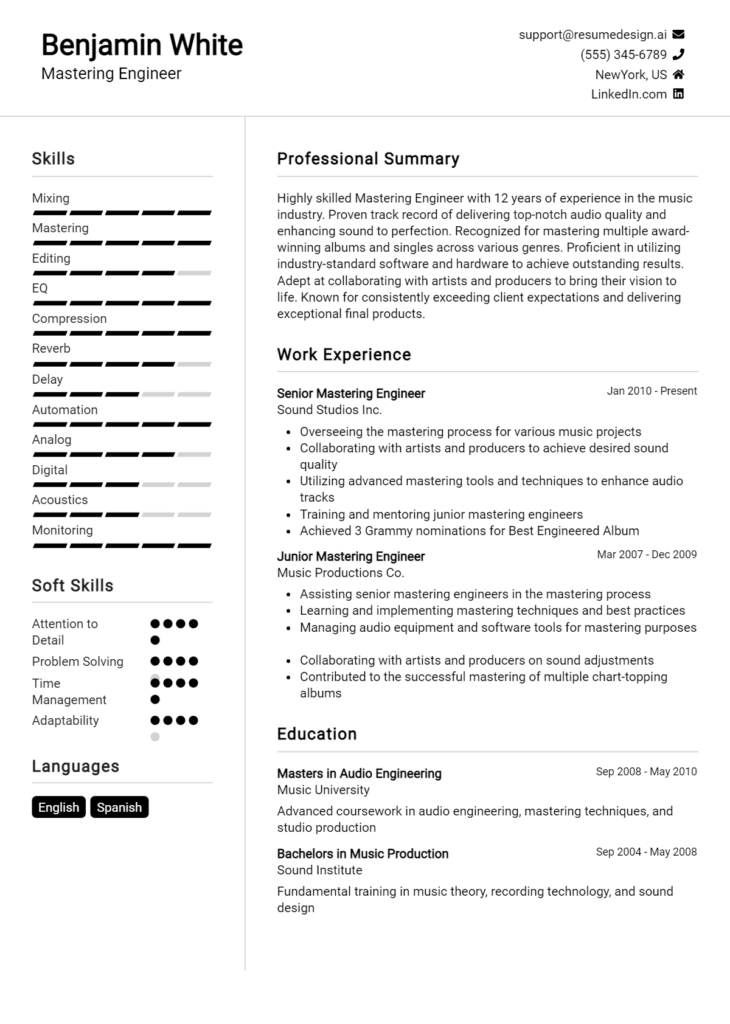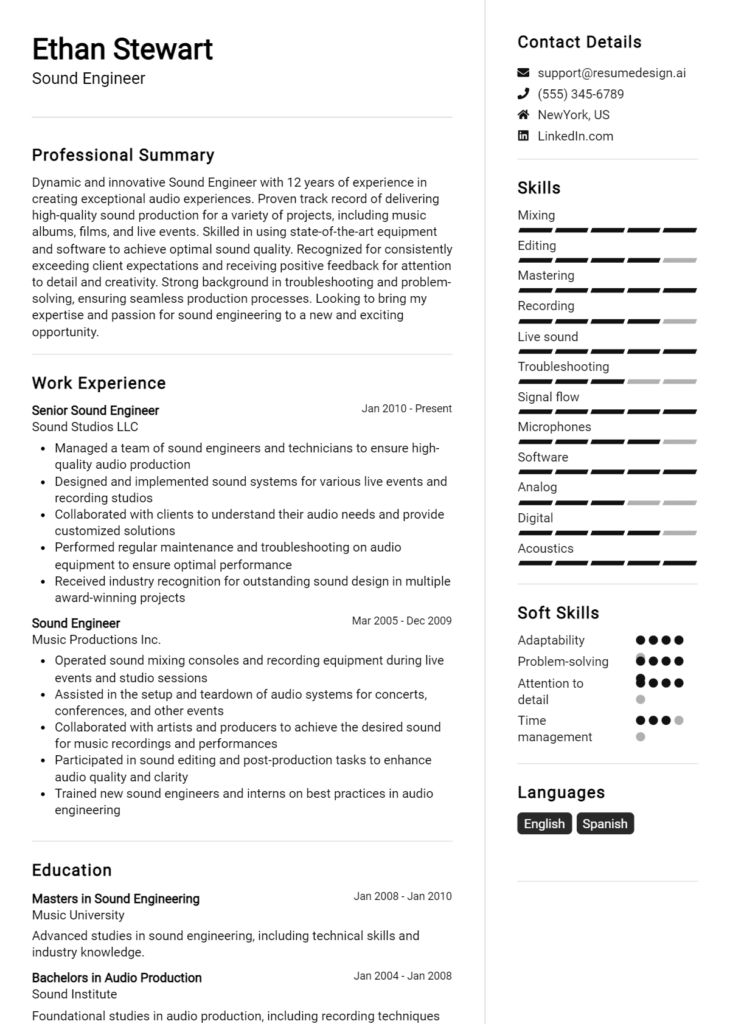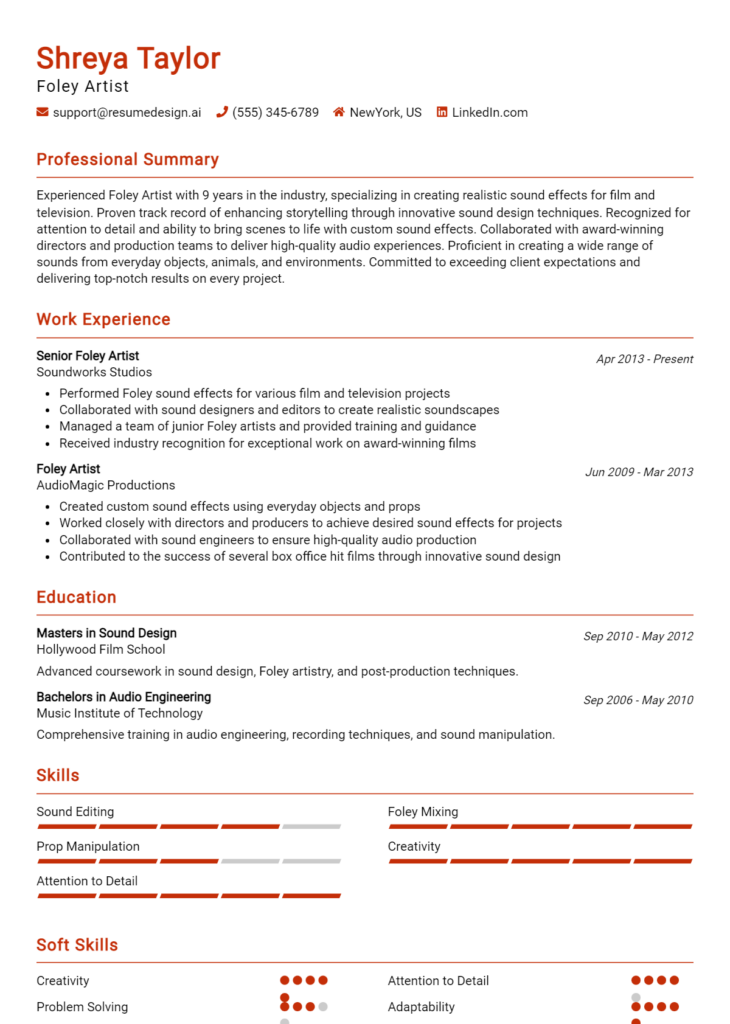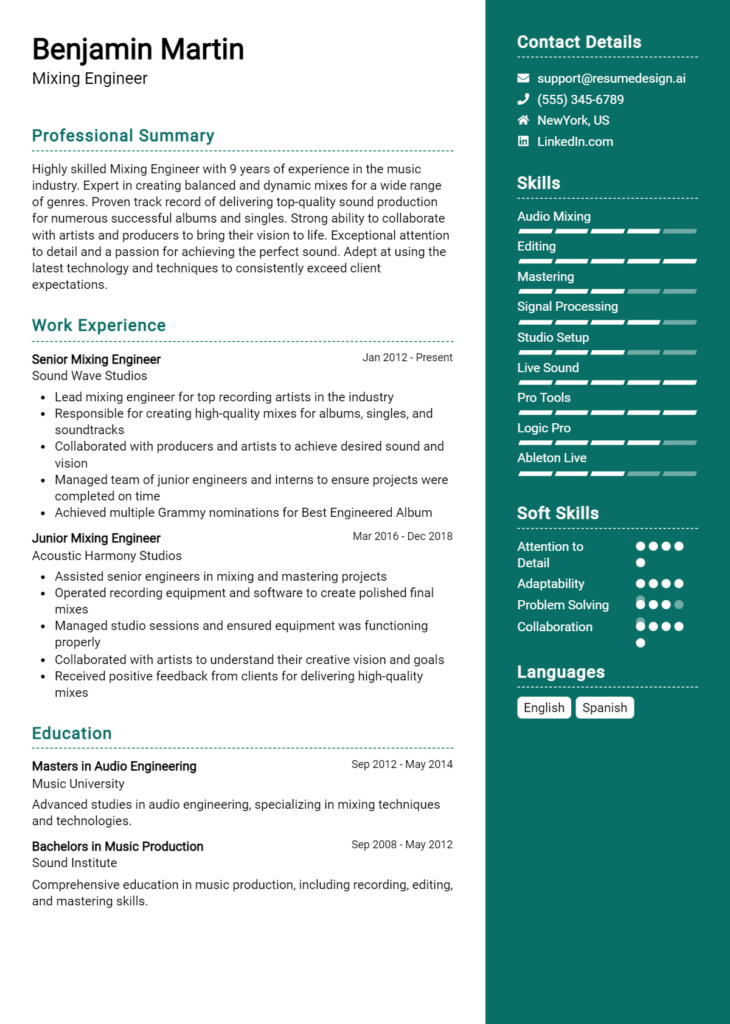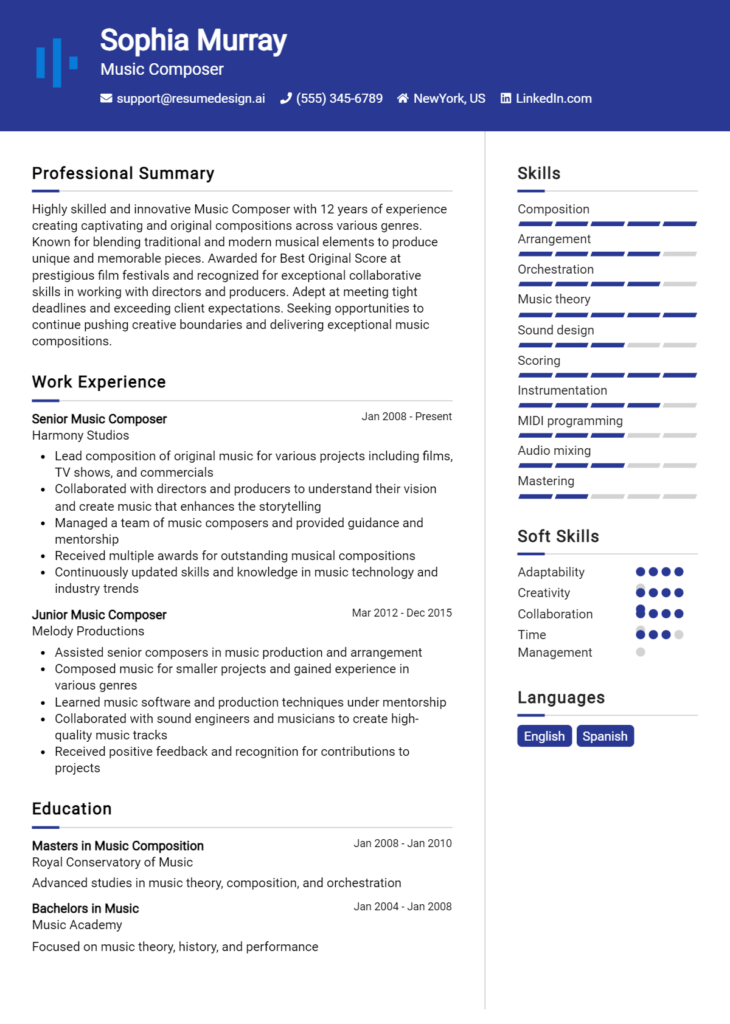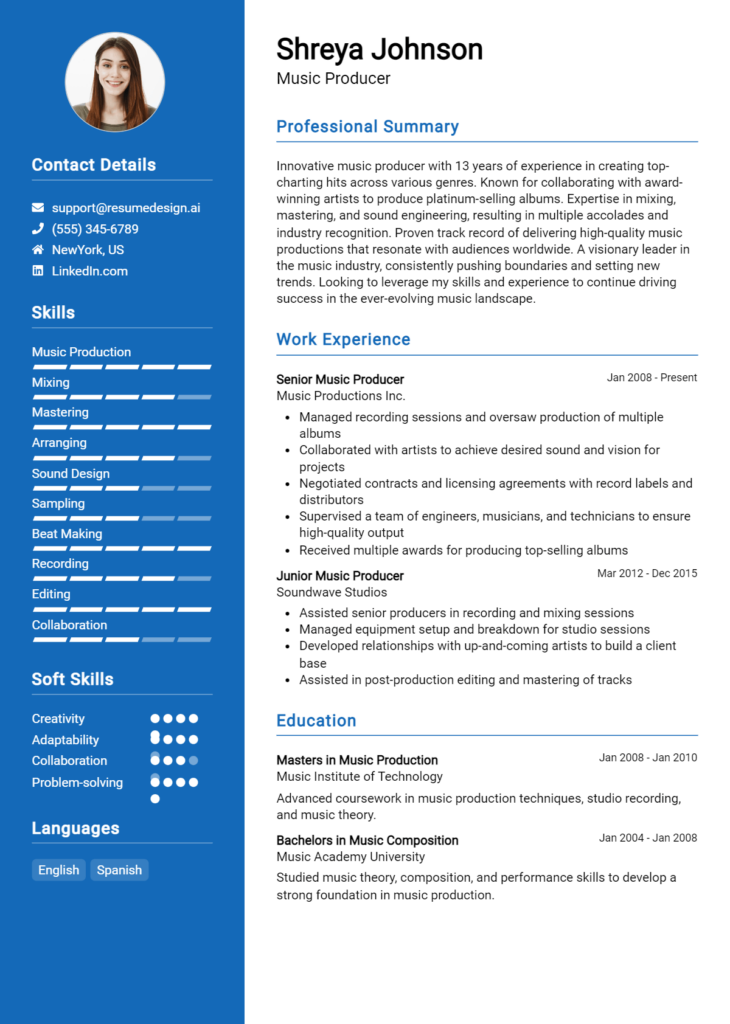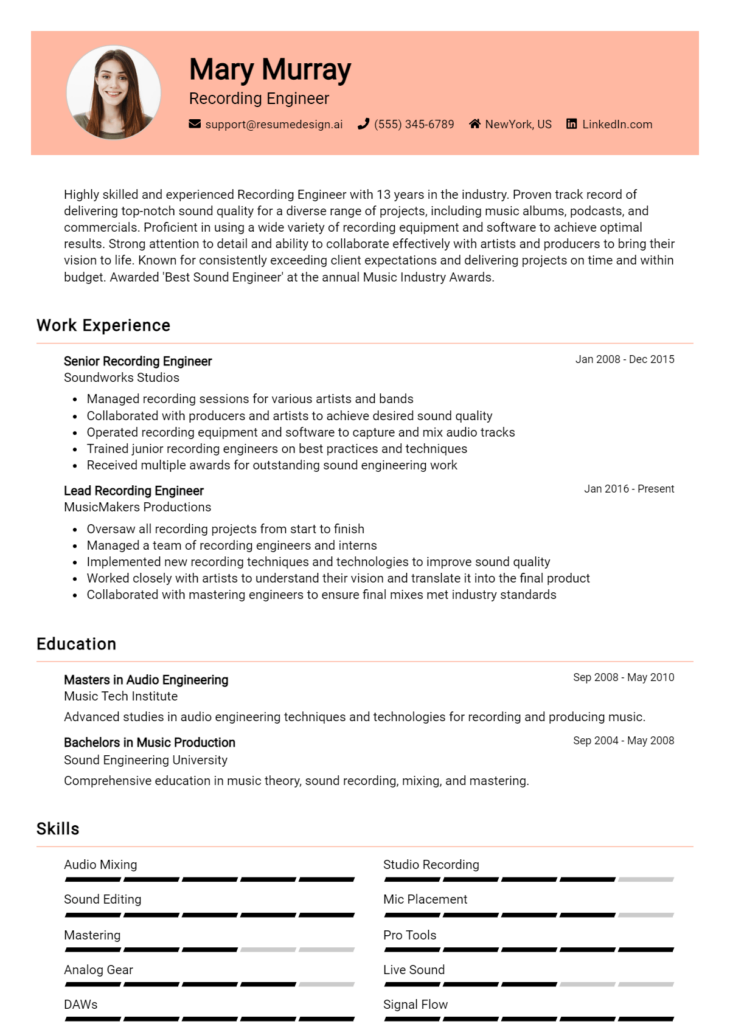Music Supervisor Core Responsibilities
A Music Supervisor plays a crucial role in the integration of music within various media projects, bridging the gap between creative and operational departments. This professional is responsible for selecting and licensing music, collaborating with directors, producers, and sound designers, and ensuring the musical elements align with the project's vision. Key skills include strong communication, technical knowledge of music rights, and problem-solving abilities. A well-structured resume that highlights these competencies is essential for demonstrating how a Music Supervisor contributes to an organization’s success.
Common Responsibilities Listed on Music Supervisor Resume
- Oversee music selection for film, television, and advertising projects.
- Negotiate and secure music licensing agreements.
- Collaborate with directors and producers to achieve artistic vision.
- Manage budgets related to music acquisition and licensing.
- Coordinate with composers and sound designers on original scores.
- Research and recommend appropriate tracks for specific scenes.
- Maintain a comprehensive music library for quick access.
- Prepare cue sheets for proper documentation and reporting.
- Stay updated on industry trends and new music releases.
- Address and resolve any copyright or clearance issues.
- Conduct meetings with stakeholders to align musical choices.
- Evaluate and provide feedback on music placements within projects.
High-Level Resume Tips for Music Supervisor Professionals
In the competitive world of music supervision, a well-crafted resume is not just a formality; it's your first chance to make a lasting impression on potential employers. As a Music Supervisor, your resume needs to encapsulate not only your professional journey but also your unique ability to curate soundtracks that enhance storytelling and elevate visual projects. It should reflect your skills, achievements, and the passion you bring to the role. This guide will provide practical and actionable tips specifically tailored for Music Supervisor professionals, empowering you to create a resume that stands out in a crowded field.
Top Resume Tips for Music Supervisor Professionals
- Tailor your resume to each job description, emphasizing relevant skills and experiences that align with the specific requirements of the role.
- Highlight your experience in music licensing, scoring, and placement within various media formats, such as film, television, and advertisements.
- Quantify your achievements by showcasing successful projects, such as the number of tracks licensed or the ratings of shows you’ve worked on.
- Include industry-specific skills such as knowledge of music rights, negotiation, and a deep understanding of music genres.
- List software tools and resources you are proficient in, like digital audio workstations (DAWs) and music cataloging systems.
- Highlight collaborations with directors, producers, and artists, showcasing your ability to communicate and work within a team.
- Incorporate keywords from the job description to pass through applicant tracking systems (ATS) and resonate with hiring managers.
- Keep your resume concise, ideally one page, allowing employers to quickly scan your qualifications and experience.
- Include a section for relevant certifications, workshops, or courses that demonstrate your commitment to professional development.
- Consider adding a portfolio link or a brief description of notable projects to provide concrete examples of your work.
By implementing these tips, you can significantly enhance your resume's effectiveness, increasing your chances of landing a job in the Music Supervisor field. A well-structured and targeted resume not only showcases your qualifications but also demonstrates your understanding of the industry and your potential value to prospective employers.
Why Resume Headlines & Titles are Important for Music Supervisor
In the competitive field of music supervision, crafting a compelling resume is essential for standing out to hiring managers. A well-thought-out resume headline or title serves as the first impression and can immediately capture attention, summarizing a candidate's key qualifications in a succinct and impactful manner. An effective headline should be concise, relevant, and tailored specifically to the music supervisor position being applied for, ensuring that it resonates with what hiring managers are looking for in a potential candidate.
Best Practices for Crafting Resume Headlines for Music Supervisor
- Keep it concise: Aim for a headline that is brief yet descriptive, ideally no more than 10 words.
- Be role-specific: Clearly indicate that you are applying for a music supervisor position.
- Highlight key skills: Include specific skills or areas of expertise relevant to music supervision.
- Use action-oriented language: Choose dynamic verbs that convey your capabilities, such as "Expert" or "Award-winning."
- Incorporate achievements: Mention any notable accomplishments that set you apart from other candidates.
- Tailor for the job: Customize your headline for each application to align with the job description.
- Showcase industry knowledge: Indicate familiarity with various genres, licensing, or music trends.
- Maintain professionalism: Ensure the tone is suitable for the industry and reflects your personal brand.
Example Resume Headlines for Music Supervisor
Strong Resume Headlines
Award-winning Music Supervisor with 10+ Years of Experience in Film and Television
Creative Music Supervisor Specializing in Indie and Alternative Genres
Innovative Music Supervisor with Proven Track Record in Licensing and Curation
Weak Resume Headlines
Music Person Looking for Work
Experienced Professional in the Music Industry
The strong headlines are effective because they are specific, highlight relevant experience, and demonstrate value, making it easy for hiring managers to see the candidate's potential fit for the role. In contrast, the weak headlines fail to impress due to their vagueness and lack of detail, leaving hiring managers uncertain about the candidate's qualifications and unique contributions to the music supervision field.
Writing an Exceptional Music Supervisor Resume Summary
A well-crafted resume summary is crucial for a Music Supervisor as it serves as the first impression for hiring managers. A strong summary quickly captures attention by highlighting key skills, relevant experience, and notable accomplishments that align with the specific job role. It should be concise yet impactful, effectively conveying the candidate's qualifications while encouraging further exploration of their resume. By tailoring the summary to the job description, candidates can demonstrate their suitability for the position, making it a vital component of their application.
Best Practices for Writing a Music Supervisor Resume Summary
- Quantify Achievements: Use specific numbers and metrics to showcase your impact in previous roles.
- Focus on Skills: Highlight relevant skills that are essential for the Music Supervisor position.
- Tailor the Summary: Customize your summary to reflect the requirements and keywords from the job description.
- Be Concise: Aim for 2-4 sentences that deliver your message clearly and directly.
- Showcase Industry Knowledge: Include any specific genres, platforms, or trends that demonstrate your expertise in the music industry.
- Highlight Collaborations: Mention notable collaborations with artists, producers, or brands that enhance your credibility.
- Use Action Verbs: Start sentences with strong action verbs to convey confidence and proactivity.
- Reflect Passion: Convey your enthusiasm for music supervision and the creative process.
Example Music Supervisor Resume Summaries
Strong Resume Summaries
Dynamic Music Supervisor with over 7 years of experience in curating soundtracks for award-winning films, resulting in a 30% increase in audience engagement and critical acclaim. Proven track record of collaborating with top artists and composers to deliver compelling audio experiences that enhance storytelling.
Results-driven Music Supervisor skilled in licensing and music placement, having secured over 100 tracks for major television networks, leading to a 25% boost in viewership for key programming. Expertise in developing tailored playlists that resonate with target demographics.
Creative Music Supervisor with a passion for indie music, successfully integrating over 50 emerging artists into popular media projects, contributing to a 15% increase in streaming revenue for featured songs. Strong network of industry contacts and a keen ear for talent.
Weak Resume Summaries
Experienced music professional looking for opportunities in music supervision. I have worked on various projects and am familiar with the industry.
Music Supervisor with a background in handling music for media. I am dedicated and have a lot of experience in the music field.
The strong examples are considered effective because they quantify achievements, specify relevant skills, and directly relate to the responsibilities of a Music Supervisor. They demonstrate clear results and a proactive approach, making them memorable. In contrast, the weak examples lack specificity and quantifiable outcomes, failing to convey the candidate's unique qualifications and contributions, rendering them generic and less impactful.
Work Experience Section for Music Supervisor Resume
The work experience section of a Music Supervisor resume is crucial as it provides a detailed account of a candidate's professional journey, illustrating their technical skills, leadership capabilities, and track record of delivering high-quality music placements. This section not only highlights specific roles and responsibilities but also showcases the candidate's ability to manage teams, collaborate with various stakeholders, and align their work with industry standards. By quantifying achievements and emphasizing relevant experience, candidates can demonstrate their value to potential employers and set themselves apart in a competitive field.
Best Practices for Music Supervisor Work Experience
- Highlight specific music licensing and supervision projects to showcase technical expertise.
- Quantify your achievements, such as the number of tracks placed in major films or TV shows.
- Include details about budget management and cost-saving measures implemented during projects.
- Demonstrate collaboration with directors, producers, and artists to emphasize teamwork.
- Use industry-specific terminology to align your experience with job postings.
- Showcase recognition or awards received for your contributions in music supervision.
- Provide context for your roles, explaining the scale and impact of the projects you worked on.
- Tailor your work experience to reflect the demands of the specific role you are applying for.
Example Work Experiences for Music Supervisor
Strong Experiences
- Successfully supervised the music for a blockbuster film that grossed over $200 million, leading to a 30% increase in soundtrack sales compared to previous releases.
- Managed a team of 5 music coordinators, streamlining the licensing process and reducing turnaround time by 25% for music clearance approvals.
- Collaborated with leading artists to create original songs for a top-rated TV series, resulting in a 50% increase in viewer engagement during the season premiere.
- Implemented a new project management system that improved communication across departments, reducing project delays by 40%.
Weak Experiences
- Worked on various music projects without specifying outcomes or roles.
- Assisted in music supervision tasks without detailing contributions or impact.
- Participated in team meetings related to music but did not clarify involvement in projects.
- Involved in music selection for shows but failed to mention the scale or significance of the projects.
The examples provided highlight the distinction between strong and weak experiences based on clarity and impact. Strong experiences are characterized by specific, quantifiable achievements that demonstrate leadership, technical skills, and collaborative efforts, making them stand out to potential employers. In contrast, weak experiences lack detail, context, and measurable outcomes, which diminishes their effectiveness in showcasing the candidate's capabilities. By focusing on robust, well-defined roles and accomplishments, candidates can present a compelling narrative of their professional journey as music supervisors.
Education and Certifications Section for Music Supervisor Resume
The education and certifications section of a Music Supervisor resume plays a crucial role in showcasing a candidate's academic background, industry-relevant certifications, and commitment to continuous learning. This section not only highlights formal education but also emphasizes specialized training and professional development that align with the music supervision field. By including relevant coursework, certifications, and specialized training, candidates can significantly enhance their credibility and demonstrate their qualifications to potential employers. This is particularly important in a competitive industry where staying updated with the latest trends and techniques is essential for success.
Best Practices for Music Supervisor Education and Certifications
- Focus on relevant degrees, such as Music Business, Music Production, or Film Scoring.
- Highlight industry-recognized certifications, like those from the Recording Academy or other music organizations.
- Include specialized training programs or workshops that are pertinent to music supervision.
- Provide details on relevant coursework that showcases your understanding of music licensing, copyright laws, and sound design.
- Keep descriptions concise but informative, emphasizing skills gained that apply to the role.
- Update this section regularly to reflect any new certifications or courses completed.
- Consider including online courses or certifications from reputable platforms that enhance your skill set.
- Use bullet points for clarity and easy readability, making sure each point is impactful.
Example Education and Certifications for Music Supervisor
Strong Examples
- Bachelor of Arts in Music Business, University of Southern California, 2021
- Certification in Music Licensing and Copyright, Berklee College of Music, 2022
- Advanced Music Production Techniques, Online Course from Coursera, 2023
- Workshop on Music Supervision for Film and TV, American Film Institute, 2023
Weak Examples
- Associate Degree in General Studies, Community College, 2019
- Certification in Basic Guitar Skills, Local Music School, 2018
- High School Diploma, 2015
- Outdated Music Theory Course, University of Anywhere, 2016
The strong examples are considered effective because they directly relate to the core competencies and knowledge areas required for a Music Supervisor role. They demonstrate a focus on relevant education and specialized training that aligns with industry needs. In contrast, the weak examples fail to provide industry-specific qualifications and relevant experience, making them less impactful for an employer looking for a candidate with a strong background in music supervision.
Top Skills & Keywords for Music Supervisor Resume
In the competitive field of music supervision, having a well-rounded resume that highlights both soft and hard skills is essential for standing out to potential employers. A music supervisor plays a pivotal role in curating the perfect soundtrack for films, television shows, and advertisements, requiring a deep understanding of music as well as the ability to collaborate effectively with various teams. Skills such as creativity, communication, and attention to detail are crucial, alongside technical knowledge of music licensing and industry trends. By showcasing these skills on your resume, you can demonstrate your expertise and readiness for the challenges of the role, enhancing your chances of landing an interview. For more insights on how to effectively present your skills and work experience, continue reading.
Top Hard & Soft Skills for Music Supervisor
Soft Skills
- Strong communication skills
- Creativity and artistic vision
- Team collaboration
- Attention to detail
- Problem-solving abilities
- Negotiation skills
- Time management
- Flexibility and adaptability
- Networking and relationship-building
- Passion for music and the arts
Hard Skills
- Knowledge of music licensing and copyright laws
- Proficiency in music editing software (e.g., Pro Tools, Logic Pro)
- Understanding of music genres and trends
- Experience with music supervision tools and databases
- Budget management skills
- Ability to source and evaluate music for projects
- Familiarity with sound design principles
- Music composition or arrangement knowledge
- Proficiency in audio mixing and mastering
- Understanding of the film and television production process
Stand Out with a Winning Music Supervisor Cover Letter
As a seasoned music supervisor with over five years of experience in sourcing, licensing, and curating music for various media projects, I am excited to apply for the Music Supervisor position at [Company Name]. My background in both music and film has equipped me with a keen understanding of how the right soundtrack can elevate a project, engage audiences, and create an emotional connection. I am passionate about discovering new talent and exploring diverse genres, ensuring that every piece of music aligns perfectly with the vision of the project.
In my previous role at [Previous Company Name], I successfully collaborated with directors and producers to select music for several award-winning films and television series. My ability to navigate complex licensing agreements and my strong relationships with artists and music publishers allowed me to secure both popular tracks and hidden gems that resonated with viewers. I pride myself on my attention to detail and my ability to remain organized in fast-paced environments, ensuring that all music selections are delivered on time and within budget.
I am particularly drawn to [Company Name] because of your commitment to innovative storytelling and your willingness to push creative boundaries. I believe that my unique blend of artistic sensibility and business acumen will contribute to your projects' overall success. I am eager to bring my expertise in music supervision to your team and collaborate with fellow creatives to craft unforgettable soundtracks that enhance the narrative and captivate audiences.
Thank you for considering my application. I am looking forward to the opportunity to discuss how my skills and experiences align with the goals of [Company Name]. I am excited about the possibility of contributing to your team's success and am confident that my passion for music and storytelling will make a meaningful impact on your projects.
Common Mistakes to Avoid in a Music Supervisor Resume
When crafting a resume for a Music Supervisor position, it's essential to highlight your unique skills and experiences effectively. However, many applicants make common mistakes that can hinder their chances of landing an interview. Avoiding these pitfalls will help ensure your resume stands out in a competitive job market. Here are some frequent missteps to watch out for:
Lack of Specificity: Failing to detail specific projects or experiences can make your resume vague. Clearly outline your role in each project, including the type of media (film, TV, advertising) and the outcome.
Ignoring Industry Keywords: Many hiring managers use Applicant Tracking Systems (ATS) to filter resumes. Not including industry-specific keywords can lead your application to be overlooked. Research common terms in the job description and incorporate them appropriately.
Overloading with Jargon: While it's important to demonstrate industry knowledge, using too much technical jargon can alienate readers who may not be familiar with all the terms. Aim for a balance that conveys expertise without overwhelming the reader.
Generic Objective Statements: A generic objective statement fails to capture the attention of hiring managers. Customize your objective to reflect your passion for music supervision and your specific goals within the role.
Neglecting Soft Skills: Music supervision is not just about technical skills; interpersonal and organizational abilities are critical. Highlight skills such as communication, collaboration, and time management to present a well-rounded profile.
Forgetting to Quantify Achievements: Using numbers to represent your accomplishments can create a stronger impact. Instead of saying you “worked on several projects,” specify that you “supervised the music for 10 feature films, increasing audience engagement by 30%.”
Inconsistent Formatting: A cluttered or inconsistent resume layout can make it difficult for hiring managers to read and understand your qualifications. Use a clean, professional format with consistent fonts and spacing to enhance readability.
Skipping Proofreading: Typos and grammatical errors can give the impression of carelessness. Always proofread your resume, or have someone else review it to catch mistakes you might have overlooked.
Conclusion
As a Music Supervisor, your role is crucial in shaping the auditory landscape of film, television, and other media. You are responsible for selecting, negotiating, and licensing music that enhances the overall storytelling and emotional impact of the project. This involves collaborating with directors, producers, and composers to curate the perfect soundtrack, while also keeping an eye on budget constraints and copyright considerations.
Key responsibilities include scouting and evaluating tracks, managing relationships with artists and labels, and ensuring that all music used aligns with the creative vision of the project. Additionally, staying updated on musical trends and emerging artists is vital in order to bring fresh and relevant sounds to the forefront.
Given the competitive nature of the industry, it's essential to present a resume that stands out. Highlight your experience with music licensing, your understanding of different genres, and any relevant projects you’ve worked on. Use metrics where possible to showcase your impact, such as successful placements or collaborations.
In conclusion, a well-crafted resume is your ticket to landing that next music supervisor role. Take the time to review and refine your resume to ensure it reflects your skills and experiences effectively. Utilize available resources such as resume templates, resume builder, resume examples, and cover letter templates to enhance your application materials. Start now to make your resume shine and take the next step in your music supervision career!

